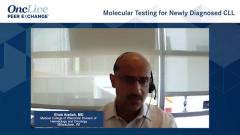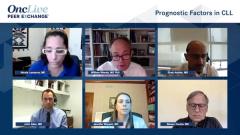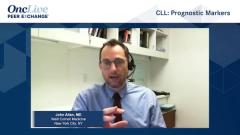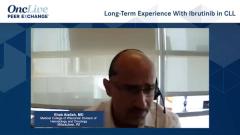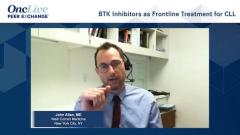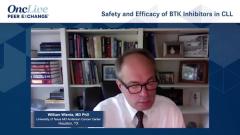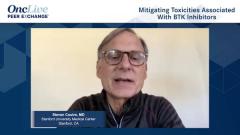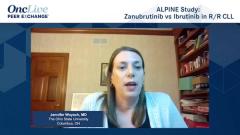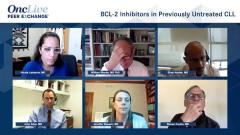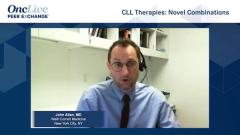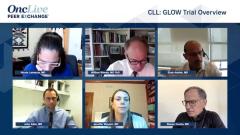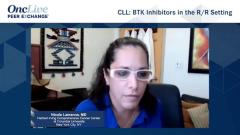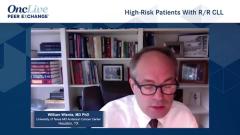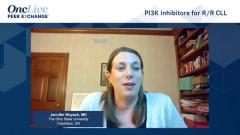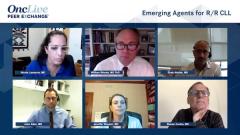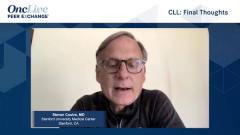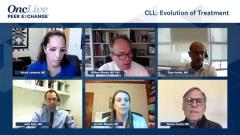
Long-Term Experience With Ibrutinib in CLL
Jennifer Woyach, MD, discusses her experience using ibrutinib for chronic lymphocytic leukemia (CLL) in the first-line setting.
Episodes in this series

William Wierda, MD PhD: We’re going to talk about treatment. There are 2 pathways you can take for first-line treatment. It’s important for each of us to provide our own perspective on how we approach those 2 pathways with patients and what drives those approaches with our population. At the 2021 ASCO [American Society of Clinical Oncology Annual Meeting] and EHA [European Hematology Association Congress] meetings this year, there was a long-term update from BTK inhibitor–based therapy. The 1 we’ve had available the longest is ibrutinib. There’s 7-plus years of follow-up on ibrutinib. Jennifer, you and your group have done a lot of work on ibrutinib. Maybe you can give your thoughts on the long-term follow-up in the first line for ibrutinib-based therapy and outcomes in those recent reports.
Jennifer Woyach, MD: These have been really exciting for me to see over the past few years as we get closer to being able to tell people what the median progression-free survival is going to be for the BTK [Bruton tyrosine kinase] inhibitors in the frontline setting. Certainly, we still don’t know, which is a great thing this year. With their RESONATE-2 study, the 6-year progression-free survival was a little over 60%. That’s getting pretty close. Looking at acalabrutinib in the phase 1b/2 study, we’ve seen up to 4 years with an event-free survival on that study of about 90%. Accounting for differences in patient population and things like that, it’s probably fairly similar in the frontline setting.
We’ve also seen updates with ELEVATE TN, which was the frontline study that looked at acalabrutinib and acalabrutinib plus obinutuzumab in the phase 3 setting. That study showed a 4-year progression-free survival rate of 78% with acalabrutinib and 87% with acalabrutinib plus obinutuzumab. Another thing that has been interesting to see with these long-term follow-up studies is that much of the toxicity you see with these BTK inhibitors tends to occur during the first year—except for hypertension, which can occur at any time and is obviously more common with ibrutinib, and AFib [atrial fibrillation], which can occur at any time as well. A lot of people who get through the first 6 months to a year relatively free of toxicity will continue to do so.
William Wierda, MD PhD: Great. Dr Attallah, maybe you can give us your perspective on what drives you in the direction of recommending a BTK inhibitor as first-line treatment for a patient. What are the patient characteristics that make you think most about BTK inhibitor–based therapy?
Ehab Attallah, MD: With a BTK inhibitor vs a BCL2 inhibitor—we may get into more details—I think of it as either continuous therapy or essentially intermittent therapy. With a BTK inhibitor continuous therapy, I think of it in situations of 17p deletion or TP53. Because from what we know from using venetoclax, a BCL2 inhibitor, those patients’ progression-free survival after stopping venetoclax will be for a short time. We have more long-term data using a BTK inhibitor in that patient population. That’s when I would consider using a BTK inhibitor.
When you discuss with patients about an intravenous medication using an antibody, obinutuzumab, some of them really don’t want to do that. That’s another group of patients I would consider a BTK inhibitor in. Lastly, with obinutuzumab and venetoclax, there’s some more involvement in terms of patients coming in, monitoring, etc, especially in the first month or 2. I would consider ibrutinib for those patients as well. It’s less monitoring, especially up front. That’s when I would really consider a BTK inhibitor as opposed to a BCL2 inhibitor.
William Wierda, MD PhD: Steve, maybe you can comment. We have long-term follow-up with ibrutinib on the RESONATE-2 trial. One thing that came out of that report was that the complete remission rate was up to 34%. As Jennifer mentioned, with continuous treatment, we don’t have a median progression-free survival. At 6½ years, it’s 61% progression-free. We’ve always had conversations around continuous therapy until progression. Is it time to start having a discussion about intermittent treatment with a BTK inhibitor? Are there trials you’re aware of that are studying that?
Steven Coutre, MD: You’re right, Bill. Going back to the beginning with the BTK inhibitors, because of their mechanism of action, their benefit is from continuous dosing. When you think about the patients who were first treated in the early trials, patients whose lives were saved, at least in the relapse setting, it made sense that they continued on treatment. But now we have a lot more experience, particularly in the frontline setting.
The ECOG trial on FCR [fludarabine, cyclophosphamide, rituximab] vs ibrutinib-rituximab was interesting. We have some data on patients who stopped treatment, not because of resistance but for other reasons, including perhaps adverse effects. They had been on treatment for a median of only about 15 months. Most patients in that period of time have a really nice clinical response. It was another almost 2 years before the average patient had any sign of progression, and not necessarily even needing treatment yet.
It raises the question of whether we can stop therapy at a certain time and monitor patients. We all have our own anecdotal experience from stopping a patient, perhaps because of atrial fibrillation, and saying, “We’re going to wait to see when you need treatment again.” I don’t know how to formalize that in a trial. That’s a difficult 1. There are trials that have looked at that in a small way, but I don’t know how to demonstrate that to make it 1 size fits all. The point is that in the appropriate setting, we’re more comfortable stopping the drug and waiting until a patient may actually need treatment again.
TRANSCRIPT EDITED FOR CLARITY


